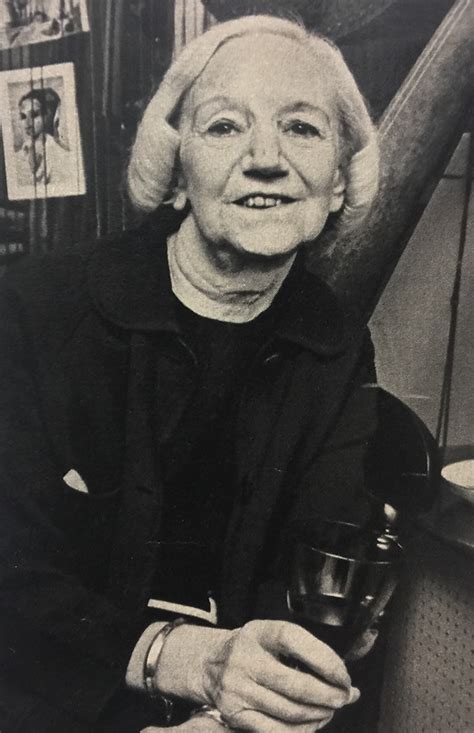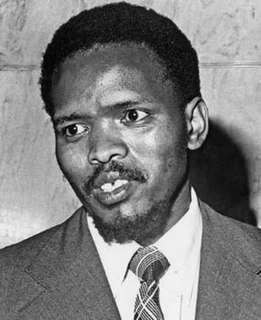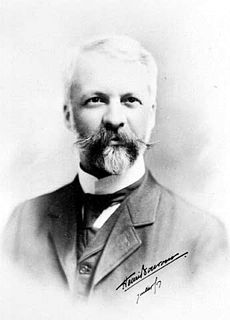A Quote by Samuel Johnson
It is the quality of patriotism to be jealous and watchful, to observe all secret machinations, and to see publick dangers at a distance. The true lover of his country is ready to communicate his fears, and to sound the alarm, whenever he perceives the approach of mischief. But he sounds no alarm, when there is no enemy; he never terrifies his countrymen till he is terrified himself. The patriotism, therefore, may be justly doubted of him, who professes to be disturbed by incredibilities.
Related Quotes
Patriotism, or the peculiar relation of an individual to his country, is like the family instinct. In the child it is a blind devotion; in the man in intelligent love. The patriot perceives the claim made upon his country by the circumstances and time of her growth and power, and how God is to be served by using those opportunities of helping mankind. Therefore his country's honor is dear to him as his own, and he would as soon lie and steal himself as assist or excuse his country in a crime.
The feeling of patriotism - It is an immoral feeling because, instead of confessing himself a son of God . . . or even a free man guided by his own reason, each man under the influence of patriotism confesses himself the son of his fatherland and the slave of his government, and commits actions contrary to his reason and conscience.
Why don’t people’s hearts tell them to continue following their dreams?” the boy asked the alchemist. “Because that’s what makes a heart suffer most, and hearts don’t like to suffer." From then on, the boy understood his heart. He asked it, please, never to stop speaking to him. He asked that, when he wandered far from his dreams, his heart press him and sound the alarm. The boy swore that, every time he heard the alarm, he would heed its message.
The fisherman has a harmless, preoccupied look; he is a kind of vagrant, that nothing fears. He blends himself with the trees and the shadows. All his approaches are gentle and indirect. He times himself to the meandering, soliloquizing stream; he addresses himself to it as a lover to his mistress; he woos it and stays with it till he knows its hidden secrets. Where it deepens his purpose deepens; where it is shallow he is indifferent. He knows how to interpret its every glance and dimple; its beauty haunts him for days.
Strange is the vigour in a brave man's soul. The strength of his spirit and his irresistible power, the greatness of his heart and the height of his condition, his mighty confidence and contempt of danger, his true security and repose in himself, his liberty to dare and do what he pleaseth, his alacrity in the midst of fears, his invincible temper, are advantages which make him master of fortune.
No man could bring himself to reveal his true character, and, above all, his true limitations as a citizen and a Christian, his true meannesses, his true imbecilities, to his friends, or even to his wife. Honest autobiography is therefore a contradiction in terms: the moment a man considers himself, even in petto, he tries to gild and fresco himself. Thus a man's wife, however realistic her view of him, always flatters him in the end, for the worst she sees in him is appreciably better, by the time she sees it, than what is actually there.
Every patriot believes his country better than any other country . . . In its active manifestation-it is fond of killing-patriotism would be well enough if it were simply defensive, but it is also aggressive . . . Patriotism deliberately and with folly aforethought subordinates the interests of a whole to the interests of a part . . . Patriotism is fierce as a fever, pitiless as the grave and blind as a stone.
The man has a curious inborn conviction of his own superiority which is quite unshakeable. All his life he has bullied and browbeaten those around him by his high-and-mightiness and his atrocious temper. As a boy he terrorized his entire family by his tantrums, when, if thwarted, he would throw himself on the floor and yell till he went blue in the face. It has been much the same ever since. Everyone's terrified of his rages. He has only to start grinding his teeth, and people fall flat before him.
It becomes more necessary to see the truth as it is if you realise that the only vehicle for change are these people who have lost their personality. The first step therefore is to make the black man come to himself; to pump back life into his empty shell; to infuse him with pride and dignity, to remind him of his complicity in the crime of allowing himself to be misused and therefore letting evil reign supreme in the country of his birth.
He put on his hat and wrapped his scarf around his jaw, but did without the wig and the sunglasses. He clicked his key chain and the car beeped and the doors locked. "That's it?" He looked up. "Sorry?" "Aren't you afraid it might get stolen? We're not exactly in a good part of town." "It's got a car alarm." "Don't you, like, cast a spell or something? To keep it safe?" "No. It's a pretty good car alarm.
Word it as softly as you please, the spirit of patriotism is the spirit of the dog and wolf. The moment there is a misunderstanding about a boundary line or a hamper of fish or some other squalid matter, see patriotism rise, and hear him split the universe with is war-whoop. The spirit of patriotism being in its nature jealous and selfish, is just in man's line, it comes natural to him - he can live up to all its requirements to the letter; but the spirit of Christianity is not in its entirety possible to him.
A man's country is not a certain area of land, of mountains, rivers, and woods, but it is a principle: and patriotism is loyalty to that principle. In poetic minds and in popular enthusiasm this feeling becomes closely associated with the soil and the symbols of the country. But the secret sanctification of the soil and the symbol is the idea which they represent, and this idea the patriot worships through the name and the symbol, as a lover kisses with rapture the glove of his mistress and wears a lock of her hair upon his heart.


































